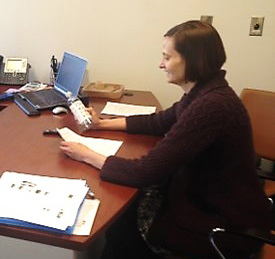
- By Rutgers University's Office of Communications
Rutgers professor Rachel Schwom (at left) is conducting interviews with emergency managers of coastal towns as part of a NOAA-Sea Grant-funded risk communication study.
Despite the unparalleled accuracy of the forecast for post-Tropical Storm Sandy, too many coastal residents either failed to fully understand the severity of the storm and the dangerous conditions it would produce, or chose not to evacuate in spite of the serious risks of staying in their homes. In early 2014, three statewide agencies, New Jersey Sea Grant, Connecticut Sea Grant and New York Sea Grant, awarded funds totaling $1.4 million to support 10 social science research projects to improve community understanding and response to coastal storm hazard information as part of the National Oceanic and Atmospheric Administration (NOAA) Sea Grant “Coastal Storm Awareness Program” (CSAP).
A team of Rutgers researchers was awarded $149,806 by NJ Sea Grant for one such project that involves a survey of NJ coastal residents. The goal is to empirically measure the effectiveness of a range of storm-related message variables, including personalization, storm risk probability formats and storm surge information. The results of the survey, titled “Best Practices in Coastal Storm Risk Communication,” will be used by the researchers to develop a tested and validated best practices coastal storm risk communication guide designed for the unique needs of emergency managers.
The Rutgers faculty members that comprise the research team are principal investigator Cara Cuite, Department of Human Ecology and Rutgers Cooperative Extension; co-principal investigator Rachael Shwom, Department of Human Ecology; and associate investigators Steven Decker, Department of Environmental Sciences; William Hallman, Department of Human Ecology; Chris Obropta, Department of Environmental Sciences and Rutgers Cooperative Extension; Karen O’Neill, Department of Human Ecology; and David Robinson, Department of Geography and the New Jersey State Climatologist.
Sea Grant’s CSAP is a part of the Disaster Relief Appropriations of 2013 (DRA), commonly referred to as the Sandy Supplemental. DRA provided supplemental appropriations to the NOAA to improve and streamline disaster assistance associated with Post-Tropical Cyclone Sandy, and for other purposes. In addition to recovering and rebuilding infrastructure from the devastation of Sandy, NOAA will conduct a coordinated program of activities to improve NOAA information and services for decision makers, communities, and the public in preparation for, response to, and recovery from other high-impact events. The results of these efforts will contribute to NOAA’s vision of resilient ecosystems, communities, and economies.
The New Jersey Sea Grant Consortium is an affiliation of colleges, universities and other groups dedicated to advancing knowledge and stewardship of New Jersey’s marine and coastal environment.
Coastal Storm Awareness Program